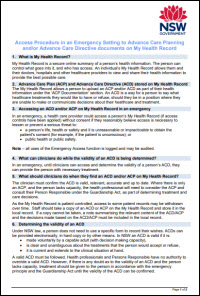 What is My Health Record?
What is My Health Record?
My Health Record is a secure online summary of a person’s health information. The person can control what goes into it, and who has access. An individual’s My Health Record allows them and their doctors, hospitals and other healthcare providers to view and share their health information to provide the best possible care.
Advance Care Plan (ACP) and Advance Care Directive (ACD) stored on My Health Record
The My Health Record allows a person to upload an ACP and/or ACD as part of their health information under the ‘ACP Documentation’ section. An ACD is a way for a person to say what healthcare treatments they would like to have or refuse, should they be in a position where they are unable to make or communicate decisions about their healthcare and treatment.
Accessing an ACD and/or ACP on My Health Record in an emergency
In an emergency, a health care provider could access a person’s My Health Record (if access controls have been applied) without consent if they reasonably believe access is necessary to lessen or prevent a serious threat to:
- a person’s life, health or safety and it is unreasonable or impracticable to obtain the patient's consent (for example, if the patient is unconscious); or
- public health or public safety.
Note – all uses of the Emergency Access function is logged and may be audited.
What can clinicians do while the validity of an ACD is being determined?
In an emergency, until clinicians can access and determine the validity of a person’s ACD, they can provide the person with necessary treatment.
What should clinicians do when they find an ACD and/or ACP on My Health Record?
The clinician must confirm the ACD is valid, relevant, accurate and up to date. Where there is only an ACP, and the person lacks capacity, the health professional will need to consider the ACP and consult their Person Responsible under the Guardianship Act, as part of determining treatment and care decisions.
As the My Health Record is patient controlled, access to some patient records may be withdrawn over time. Staff should take a copy of an ACD or ACP on the My Health Record and store it in the local record. If a copy cannot be taken, a note summarising the relevant content of the ACD/ACP and the decisions made based on the ACD/ACP must be included in the local record.
Determining the validity of an ACD
Under NSW law, a person does not need to use a specific form to record their wishes. ACDs can be provided electronically, in hard copy or by other means. In NSW an ACD is valid if it is:
- made voluntarily by a capable adult (with decision making capacity)
- is clear and unambiguous about the treatments that the person would accept or refuse
- it is current and extends to the clinical situation at hand.
A valid ACD must be followed. Health professionals and Persons Responsible have no authority to override a valid ACD. However, if there is any doubt as to the validity of an ACD and the person lacks capacity, treatment should be given to the person in accordance with the emergency principle and the Guardianship Act until the validity of the ACD can be confirmed.
Can anyone upload an ACD on behalf of a person on their My Health Record?
For ACDs and ACPs, only the consumer, their authorised representative or nominated representative (who has full access control) can upload such documents on the My Health Record.
What should be done if there is doubt about the validity of an ACD?
When there is genuine and reasonable doubt as to the validity or application of an ACD, an application can be made to the NSW Supreme Court to seek clarification and guidance. If a decision is needed urgently, then the case can be expedited. In the meantime, treatment can be provided in accordance with the emergency principle and the Guardianship Act. Legal advice should be sought.
